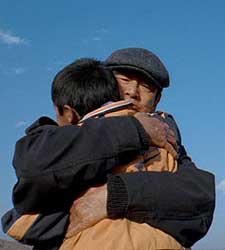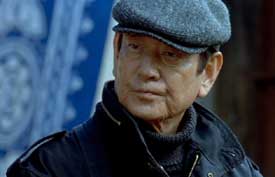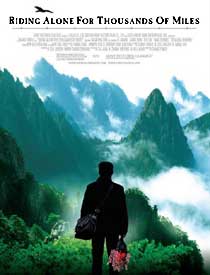 Yimou Zhang, China's greatest living film director, conceived Riding Alone for Thousands of Miles (Quian li zo dan qui, 2006) right from the start as a vehicle for Japanese superstar Ken Takakura. Yimou said he wouldn't have made the film at all if Ken for any reason would not be in it.
Yimou Zhang, China's greatest living film director, conceived Riding Alone for Thousands of Miles (Quian li zo dan qui, 2006) right from the start as a vehicle for Japanese superstar Ken Takakura. Yimou said he wouldn't have made the film at all if Ken for any reason would not be in it.
To some extent is is like a love-letter to the silent, stoic, sad-looking man Ken played in the 1960s, the strong silent type who never weeps.
That's pretty much the very character who is now an old man estranged from a son dying of renal cancer, & he still doesn't know how to talk to people, or how to cry, though he really is a man of deep emotion.
The sentimentality is a bit thick at times, being about the emotional lives of men, a three-hanky weepy of the sort usually associated with female characterizations. But the acting is so good, the sweeping images of Hunnan Province are so spectacular, that it seems great art rather than melodramatics, & can leave the viewer drained even without large events.
Through what is more or less a misunderstanding, Ken's character Gou-ichi Takata comes to believe that his son regrets dying without seeing a specific opera master's most famous performance. Li Jiamin pretty much plays himself in this role, a national treasure in the folk opera tradition.
 Takata sets out for China to video tape the opera master, who turns out to be serving time in prison. Takata sets out for China to video tape the opera master, who turns out to be serving time in prison.
After working his way through the beuracracy to get permission to film a performance in the prison, the opera actor turns out to be too depressed to perform, as he desires to see his son.
Thus Takata sets off into the interior of China to find a small boy, to bond with that boy, to become lost in the wilderness with that boy, a non-actor out of whom Yimou Zhang encourages a marvelous performance.
On the surface it is about a man who hopes to find reconciliation with his dying son before it is too late to convey the love he feels. But what unfolds is much more an interior journey of self-discovery, despite the expansive exterior Takata explores.
In one way the film "chickened out" on the "old age of the strong silent type" theme by having Ken narrate what he's thinking at times when characters in the film are denied such information.
I think the viewer should've been denied that narrator's voice, too, as Ken's acting is such we can read him without his voice-over explanation, & the situations are pretty obviously sad ones. The idea that this silent man might keep a running diary was absurd & I do wonder if Zhang was interferred with by some distributor who didn't like that the main character scarsely ever speaks out loud.
Word is, though, that Zhang was given carte blanch to make any film he wanted any way he wanted, without interference, thanks to the success of Hero (2004) & House of Flying Daggers (2006).
Apparently, illogical as it sounds, without the commercial success of his first two action films, he would not have been allowed the liberty of making a film with no action in it at all.
A few critics disliked Yimou Zhang veering into pictorial costume epic kung fu extravaganzas when films of character set in modern China were his established forte.
But it was the action films that became international superhits; he really wanted to make them; & he made them with the same high artistic sense as for his "serious" films, so that we now have a small body of wuxia of real merit from him, the success of which having permitted him to take on projects that are harder sells to the public, such as Riding Alone for Thousands of Miles.
copyright © by Paghat the Ratgirl
|

